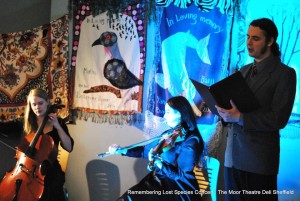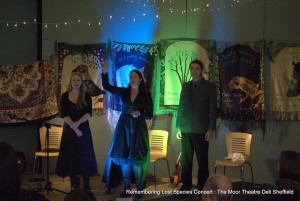Last week, I was involved in a special night of remembrance for extinct species, along with the wonderful Nancy Kerr and Sarah Smout. It was a part (albeit slightly late) of the now international event, initiated by ONCA.
It is a gift in my work to occasionally get to do things that feel incredibly important – that step outside the normal remit of performance and become something timely and meaningful. Our night was full of song, story and ritual elements, all against the backdrops created by the event organiser and craft guru Abi Nielsen.

It was a powerful evening, and I thought I’d include here the text of the communion I wrote and read before we broke and shared bread.
Welcome back
Hello and welcome back. I hope you’re all feeling refreshed and settled and ready for more. We’re going to start with a short ritual, a breaking and sharing of bread, and I will say a few words to acknowledge why we are here tonight. I want to apologise in advance to the gluten intolerant here with us—and invite you to participate in whatever way feels appropriate.
Address
We choose this symbol of breaking bread and partaking in a communion together because of the ancient ritual associations that permeate it. Beyond the Jewish and Christian connotations, the idea of sharing bread runs through our culture and our language. In Aramaic, the word for “friend” is “balinjeera”, one with whom we share bread. In English, “companion”, from the latin words for togetherness and bread. But I want us to recognise that here today this act has its own meaning, it is a new and radical communion.
In the Ascent of Man, Bronowski argued that the history of human civilisation was the history of our relationship with wheat. For the hundreds of thousands of years that humanity has been in existence, we have been in a dance with this planet. Living on it and with it, guided and shaped by the land, the weather, the movements and lives of other species. But with the domestication of wheat there came a shift in the balance of that dance. Where once we had been followers, now we were the leader. Now we would shape the earth, toil and sweat in the dust to make the ground bring forth the crops we planted.
And I don’t condemn human beings in our desire to impose our own vision upon the land—this is, as I said, the basis of civilisation. But the time has come to recognise that in this dance, our steps have been clumsy, that we have twirled this planet wildly, cruelly. Dangerously.
There is nothing new in extinction.
Let me say that again—there is nothing new in extinction. The lifetime of all species on this planet is ultimately finite, a macrocosmic reflection of the mortality of each individual life. Species have risen and fallen before, sometimes in isolated incidents, sometimes in seemingly great, mass die-offs.
We are now in what archaeologists, palaeontologists recognise as the sixth period of mass extinction that this planet has faced. All this has happened before and will happen again. The only difference this time is that we, human beings, have lead and pushed and guided the course of our planet, our environment, into this time of death.
And there is a question, a burning question around what we should do next. Around how we should change. How we can fix this. I say, leave that until tomorrow. For now, let us join together as a human community. Let us recognise those species that have departed with a profound empathy, shared partners in the great dance of life. Let us acknowledge our animal bodies, still very much dependent on the bounty of the Earth to grow and thrive.
Breaking of bread
I invite you to take a few moments of silence. To reflect on whatever powers you hold to be important, whether that is the God of your understanding, the magnificence of the natural world, the glory of our shared humanity. I offer up this loaf of bread. It is the bounty of the Earth, our home. It is born from the light of the sun, watered by the gentle caress of rain. It is the labour of human hands.
As we eat it, may we be nourished. May we remember our place, our connectedness. May our hearts be open.
May it become, for us, the bread of life.
And so it is.

Leave a Reply